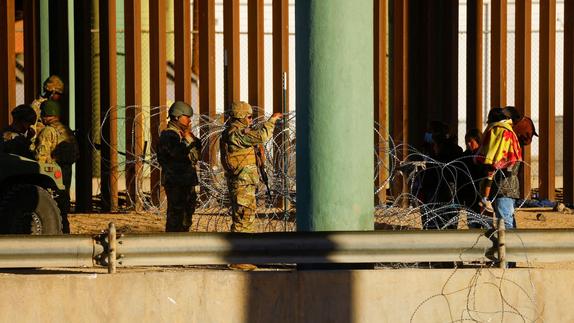 Members of the Texas National Guard stand guard on the banks of the Rio Bravo river, the border between the United States and Mexico, with the purpose of reinforcing border security and inhibiting the crossing of migrants to the US, seen from Ciudad Juarez, Mexico, Dec 27, 2022. (JOSE LUIS GONZALEZ / REUTERS)
Members of the Texas National Guard stand guard on the banks of the Rio Bravo river, the border between the United States and Mexico, with the purpose of reinforcing border security and inhibiting the crossing of migrants to the US, seen from Ciudad Juarez, Mexico, Dec 27, 2022. (JOSE LUIS GONZALEZ / REUTERS)
GENEVA - New border enforcement measures announced by the US could undermine the foundations of international human rights and refugee law, UN High Commissioner for Human Rights Volker Turk said Wednesday.
UN High Commissioner also expressed concern that those most in need of asylum and those in vulnerable situations are unlikely to meet the requirements to be granted humanitarian parole, including having a financial sponsor in the USA
"These measures appear to be at variance with the prohibition of collective expulsion and the principle of non-refoulement," the UN Human Rights Chief said.
ALSO READ: White House: Efforts needed to fix 'broken' US immigration system
The measures include the increased use of expedited removals, and expansion of the use of the Title 42 public health order allowing for the fast-track expulsion to Mexico of some 30,000 Venezuelans, Haitians, Cubans and Nicaraguans each month.
According to the UN figures, Title 42 has already been used by US immigration officials some 2.5 million times at the southern border, to expel people to Mexico or their home country without an individualized assessment of all their protection needs, due process and procedural safeguards.
ALSO READ: Biden visits US-Mexico border as immigration issue heats up
The High Commissioner also expressed concern that those most in need of asylum and those in vulnerable situations are unlikely to meet the requirements to be granted humanitarian parole, including having a financial sponsor in the USA.
"We hear a great deal of talk about migration crises, but in reality, it is those migrating who often are the ones truly in crisis. Rather than vilifying them and stripping them of long-recognized rights, we should be seeking to govern migration humanely and safely with full respect for the human rights of every individual," he stressed.


